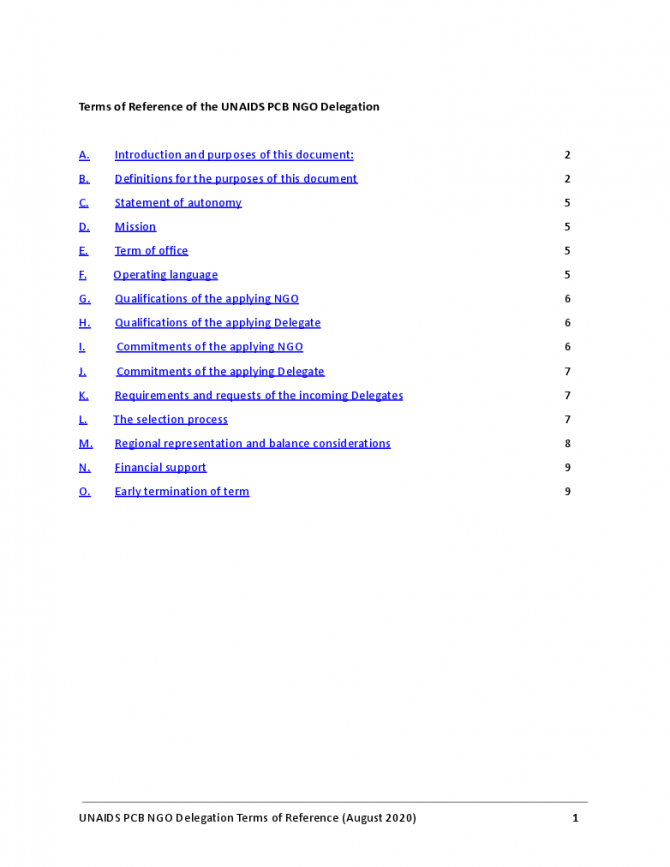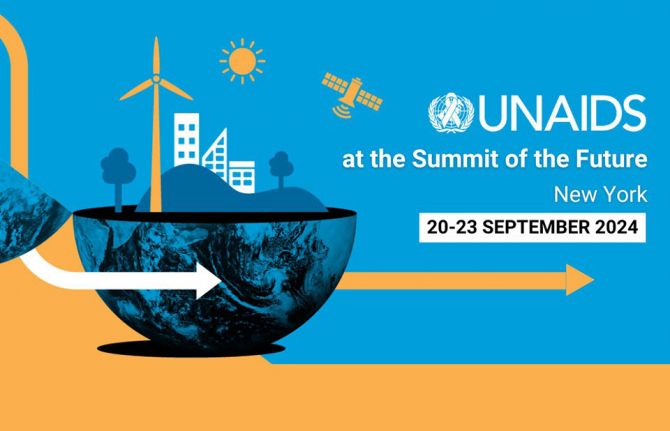PCB Programme Coordinating Board

Press Release
Governments, civil society and United Nations agencies join together to “accelerate and sustain” a resilient response to HIV
27 June 2024 27 June 2024GENEVA, 27 June 2024—At the 54th meeting of UNAIDS’ Programme Coordinating Board (PCB) which concluded today in Geneva, Switzerland, governments, civil society and United Nations agencies united in a shared commitment to accelerate progress to meet the 2025 AIDS targets and sustain the gains of the global HIV response toward 2030 and beyond.
In her opening remarks to the meeting, the Executive Director of UNAIDS, Winnie Byanyima, highlighted the urgency of accelerating progress to meet the 2030 target of ending AIDS as a public health threat. “The world has six years to reduce new HIV infection rates, expand antiretroviral treatment, and reduce AIDS-related deaths, but only 18 months to reach the 2025 targets which will determine whether or not countries will be able to end their pandemics by 2030.”
She warned that there was ‘nothing sustainable about an expanding pandemic’ and called on members to join UNAIDS in ‘throwing everything we can’ at HIV prevention, making medicines and health technologies for HIV prevention and treatment equitable, affordable and accessible, and building stronger health systems’.
“We have a choice,” said Ms Byanyima. “We can accelerate now, drive rates down, and succeed. Or we can get distracted, focus only on what we’ve gained so far, and miss the opportunity to end AIDS. We must accelerate in order to sustain.”
She noted that sustainability also requires progress on widening fiscal space and addressing indebtedness of low- and middle-income countries, protecting human rights and gender equality, and called on all partners and allies to embrace a ‘bold vision of sustainability—one capable of ending the AIDS pandemic.’
Ms Byanyima emphasised the funding constraints which are hampering progress in the AIDS response highlighting the US$ 8.5 billion shortfall in funding for HIV. In 2022, US$ 20.8 billion was available for HIV funding in low- and middle-income countries whereas the estimated need by 2025 is US$ 29.3 billion. She called on all donors to ensure that the Joint Programme is fully funded to the agreed minimum levels of US$ 160 million for 2024.
On the opening day of the meeting Germany announced that it would be increasing its funding to UNAIDS. “Germany has decided to increase its contribution to UNAIDS in 2024 by € 2 million, from € 4.75 million in 2023 to € 6.75 million. We trust that this decision shall contribute to the minimum budget requirements of US$ 160 million to ensure that UNAIDS can adequately implement its workplan and budget,” said Binod Mahanty, Senior Policy Advisor, Federal Ministry of Health of Germany.
The Board reviewed the performance of the Joint Programme and appreciated the wide scope and in-depth contribution of UNAIDS to the global AIDS response at the global, regional and country levels.
The critical role of communities in continuing to lead the way in responding to HIV was highlighted as central to sustainability of the HIV response, which was the focus of the thematic segment on the final day: Sustaining the gains of the global HIV response to 2030 and beyond.
Ms Byanyima said, “To end AIDS, the foundation must be people living with HIV, civil society and communities. They are indispensable and non-negotiable for ending the pandemic, sustaining the response and ensuring accountability for all.
Florence Riako Anam, Co-Executive Director of the Global Network of People Living with HIV (GNP+), gave a powerful keynote address during the thematic session, she said, “People living with HIV will be here in 2031. For us, the sustainability of the HIV response is a journey of transformation and not a destination with an end date.” Other keynote speakers included H.E. Edwin Dikoloti, Minister of Health of Botswana and the Former President of the Republic of Chile Michelle Bachelet.
Ahead of the PCB, building on its longstanding partnership with the Global Fund to Fight AIDS, TB and Malaria, UNAIDS signed a new strategic framework for cooperation and collaboration to end AIDS. Joining the PCB discussions the Director of the Global Fund, Peter Sands said, “Optimizing HIV and primary health care integration requires well-coordinated partnerships between governments, private sector companies, international organizations, and non-government organizations.”
John Nkengasong, U.S. Global AIDS Coordinator and head of PEPFAR, said that gains were fragile and need to be sustained. "2030 is critical because at that point the global community either says ‘we have done our best and we don’t know what else to do’ or do we say, ‘YES! we can get to the finish line’...2030 is a mountaintop moment.” He also called for UNAIDS to be fully funded to continue its life-saving work.
The Board meeting provided an opportunity for UNAIDS to announce a new high-level panel on a resilient and fit-for-purpose UNAIDS Joint Programme. The Panel will consider the evolution of the pandemic and the global response as well as the evolving country needs within the overall context of the Joint Programme’s mandate.
This week also saw the release of a new report by on Drug Use, Harm Reduction and the Right to Health, demonstrating the public health necessity of moving away from punitive approaches to people who use drugs – a step towards ensuring access to health care for marginalized communities.
The 54th PCB was chaired by Kenya, represented by Harry Kimtai, Principal Secretary, State Department for Medical Services, Nairobi, with Brazil serving as the Vice-Chair and Netherlands as Rapporteur. The Report to the Board by the UNAIDS Executive Director, and the reports for each agenda item and the PCB’s decisions can be found at: 54th UNAIDS Programme Coordinating Board.
The 55th meeting of the PCB will take place 10-12 December 2024, in Nairobi, Kenya.
UNAIDS
The Joint United Nations Programme on HIV/AIDS (UNAIDS) leads and inspires the world to achieve its shared vision of zero new HIV infections, zero discrimination and zero AIDS-related deaths. UNAIDS unites the efforts of 11 UN organizations—UNHCR, UNICEF, WFP, UNDP, UNFPA, UNODC, UN Women, ILO, UNESCO, WHO and the World Bank—and works closely with global and national partners towards ending the AIDS epidemic by 2030 as part of the Sustainable Development Goals. Learn more at unaids.org and connect with us on Facebook, Twitter, Instagram and YouTube.

Feature Story
Mountaintop moment: Ensuring a sustainable AIDS response beyond 2030
27 June 2024
27 June 2024 27 June 2024Key figures in the AIDS response came together at the 54th meeting of the UNAIDS Programme Coordinating Board (PCB) to discuss how to ensure that the gains from the HIV response can be sustained beyond 2030.
During the PCB’s thematic segment, participants heard that the aim of sustainability is not to maintain the HIV response in its current form but to ensure the durability of the impact of the HIV response. This will require a shift in focus to long-term sustainability.
“Until there’s a cure or a vaccine, we will need to sustain the AIDS response beyond 2030, in every part of the world, in the north and in the south,” said Winnie Byanyima, UNAIDS Executive Director. “Sustainability is at the heart of the vision of the Sustainable Development Goals (SDGs), with the commitment that the needs of the present are met without compromising the ability of future generations to meet their own needs.”
Remarks echoed by Florence Anam, co-Director of the Global Network of People Living with HIV (GNP+), “People living with HIV will be here in 2031 and beyond so for us the sustainability of the HIV response is a journey of transformation and not a destination with an end date,” she said. “It matters that at the center of this process of change, mechanisms are in place for all who need treatment and prevention services and that this care is inclusive, devoid of stigma and discrimination.”
The strategies and delivery mechanisms required for scaling up prevention and treatment services and to ensure a stable enabling environment to reach the 2030 target will differ from those that will be needed for long-term sustainability. Leveraging societal enablers will be especially critical for sustainability, including minimizing HIV vulnerability and ensuring access to services in future decades. Rather than build incrementally on what is already in place, sustainability will demand transformations in human rights based, people-centred policies, programmes and systems.
In addition, sustainability requires action on the political, financial, and programmatic front – and across sectors. Not only health, but also gender equality and education so that the economic and societal drivers of new infections are tackled.
Michelle Bachelet, former President of Chile, in a video statement, said, “The combination of shared responsibility and country leadership is essential. Developing countries need to own the response and increase their self-reliance but global action is required to create an enabling environment for this to happen.”
Countries are being advised to prioritize the careful and effective integration of the HIV response in national health systems, with appropriate attention to reforms or modifications required for key and vulnerable populations. This transformation will increase efficiency, promote equity, maximize resource utilization and contribute to the dual goal of achieving and sustaining HIV epidemic control and strengthening human rights based, people-centred systems for health.
Together with its co-sponsors, partners such as PEPFAR and the Global Fund, and other stakeholders, the Joint United Nations Programme on HIV/AIDS are supporting countries to develop roadmaps to sustain their national AIDS responses.
"Sustainability road maps are critical, starting with the vision,” said Peter Sands, the Global Fund Director. “Strategic financing then needs to support the path to that vision, focused both on continuing to raise resources as well as using those that are available more efficiently. To optimize HIV and primary health care integration requires well- coordinated partnerships between governments, private sector companies, international organizations, and non-government organizations.”
John Nkengasong, U.S. Global AIDS Coordinator and head of PEPFAR, also stressed that gains in the HIV response are fragile and need to be sustained. "Today we find ourselves at a crossroads to 2030 where we go somewhere or we go nowhere,” he said. “2030 is critical because at that point the global community regardless of where people are sitting, either say we have done our best and we don’t know what else to do or do we say, ‘Yes, we can get to the finish line’...2030 is a mountaintop moment.”
Finally, sustainability will also require adapting measures and approaches in diverse settings, highlighting the importance of tailoring planning and implementation for specific contexts.
Related

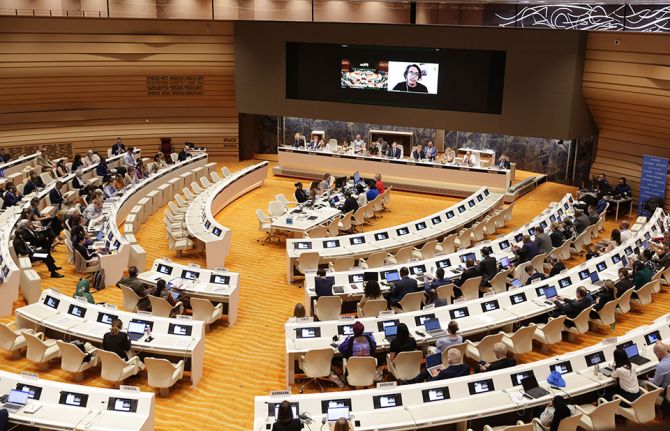
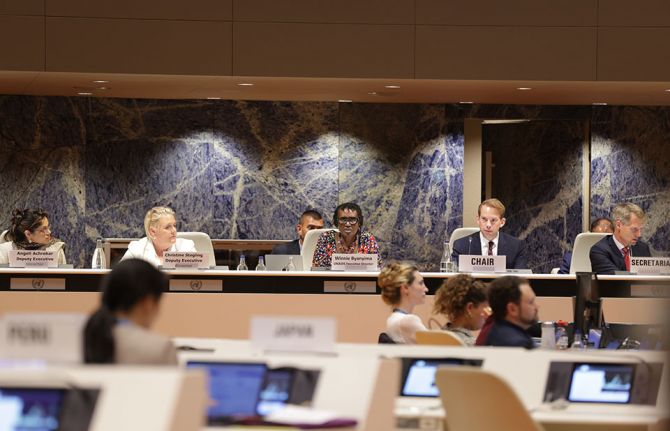
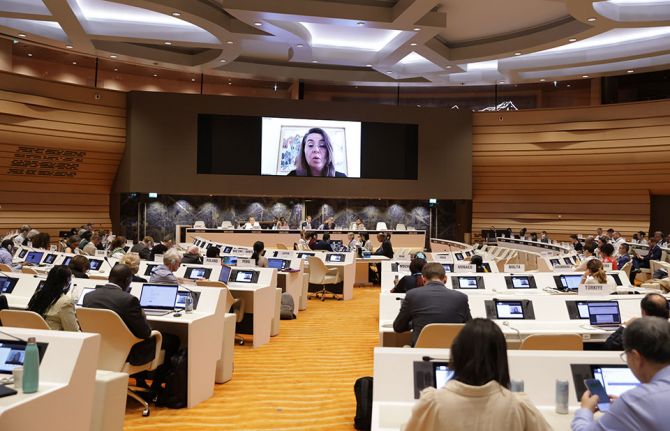
Press Release
UNAIDS Board closes with commitment to resource the HIV response and tackle the inequalities holding back progress
28 June 2023 28 June 2023GENEVA, 28 June 2023—The 52nd meeting of UNAIDS’ Programme Coordinating Board (PCB) concluded today in Geneva, Switzerland with Board members showing strong support to fully fund the Joint Programme and a commitment to overcome the barriers to ending AIDS by 2030.
In her opening remarks to the meeting, the Executive Director of UNAIDS, Winnie Byanyima, described the AIDS response as being under severe strain with the multiple challenges caused by what has been termed ‘polycrisis’. She revealed that in 2021, debt repayments for the world’s poorest countries reached 171% of all spending on healthcare, education and social protection combined—choking countries’ capacities to respond to HIV.
She also highlighted major challenges across a broad spectrum of human rights issues worldwide including women’s rights and gender equality, sexual and reproductive health and rights, the human rights of LGBTQI people, civil society’s freedom of association and more.
“Human rights challenges affect our ability to connect people to health services to control AIDS and all pandemics,” said Ms Byanyima. “We must halt and reverse these harmful trends. Doing so requires longer-term funding as such efforts do succeed over time and funding is critical to stay ahead of the curve.”
She called for global solidarity and a renewed commitment from all partners to get the job of ending AIDS done, for everyone, everywhere. “The work we do together to end AIDS is not only crucial to overcoming pandemics broadly. The global AIDS response is the pathway to advancing progress on other Sustainable Development Goals (SDG’s),” she said.
She noted that just 12% of the SDG’s are on track and that one of the only examples of progress is towards achieving SDG 3 – To ensure healthy lives and promote well-being for all ages – and specifically the progress made towards SDG 3.3, which includes ending AIDS.
Further to the UK’s announcement last year of an increase in funding to UNAIDS from £2.5 million in 2021 to £8 million in 2022, the UK recommitted to maintaining funding for 2023 at £8 million which was warmly welcomed by UNAIDS. As was the announcement of a multiple year 10 million Euro commitment to UNAIDS from Ireland.
Ms Byanyima emphasized the enormous efforts UNAIDS has made to reduce costs including a 10% reduction in total staff costs and the reconfiguration of regional support to countries in Eastern Europe and Central Asia as well as in the Middle East and North Africa. Despite these efforts she raised serious concerns over the US$ 51 million shortfall against UNAIDS core budget of US$ 210 million saying, “We have exhausted all options for achieving greater efficiency in our delivery. There is no scope for ‘doing more with less’.”
A thematic segment was held on the third and final day of the Board meeting on Priority and key populations, especially transgender people, and the path to 2025 targets. This provided the Board with an opportunity to discuss the inequalities preventing progress in the AIDS response for key populations and how the HIV response can more effectively reduce the risk and impacts of HIV among these populations.
Erika Castellanos, Director of Programmes at the Global Action for Trans Equality told her story growing up as a transgender person and her experience living with HIV. She talked about the enormous challenges she faced growing up and why she has committed her life to helping others. Her moving and passionate speech received a standing ovation from Board members.
“We need to do better. We need to stop demonizing - sexualizing and hating trans and gender diverse people, said Ms Castellanos. “More than allies, we need our fellow humans, our family, our friends, our work colleagues, to see us as equal to, as same as, not different from. When we view the world through the lens of what unites us, rather than what divides us, we have a much better chance of improving the lives, health and human rights of all persons on this earth. And after all, is that what we all really want most of all? To love, and to be loved?”
Also, during the thematic discussions was the powerful intervention of Justice Edwin Cameron who formerly served as Justice of the Constitutional Court of South Africa. He urged countries to, “create a legal environment that enables, a system of law that doesn’t disable marginalized and vulnerable groups. To employ the law to empower rather than oppress. It means scrapping pointlessly moralistically, punitive criminal laws. It means equality before the law.” Reflecting how central community-led responses are to the HIV response, the PCB non-governmental delegation reminded all present that communities ‘aren’t just targets of interventions, we are the intervention.’
The Board meeting also provided an opportunity to launch the Compendium of Promising Practices on the role of African faith community interventions to end paediatric and adolescent HIV. HIV prevalence among children and adolescents in Africa remains a deeply concerning issue. As does access to treatment where more than three quarters of all adults living with HIV are accessing treatment compared to only half of children. The Compendium will highlight successful models and best practices implemented by faith-based organizations to share knowledge and strengthen the response to HIV for children and adolescents.
The meeting was chaired by Germany, with Kenya serving as the Vice-Chair and Brazil as Rapporteur. The report to the Board by the UNAIDS Executive Director, the reports for each agenda item and the PCB’s decisions can be found at: UNAIDS Executive Director's report to the 52nd UNAIDS Programme Coordinating Board. The 53rd meeting of the PCB will take place in Geneva on 12-14 December 2023.
UNAIDS
The Joint United Nations Programme on HIV/AIDS (UNAIDS) leads and inspires the world to achieve its shared vision of zero new HIV infections, zero discrimination and zero AIDS-related deaths. UNAIDS unites the efforts of 11 UN organizations—UNHCR, UNICEF, WFP, UNDP, UNFPA, UNODC, UN Women, ILO, UNESCO, WHO and the World Bank—and works closely with global and national partners towards ending the AIDS epidemic by 2030 as part of the Sustainable Development Goals. Learn more at unaids.org and connect with us on Facebook, Twitter, Instagram and YouTube.
Related documents
Related
 How the shift in US funding is threatening both the lives of people affected by HIV and the community groups supporting them
How the shift in US funding is threatening both the lives of people affected by HIV and the community groups supporting them

18 February 2025
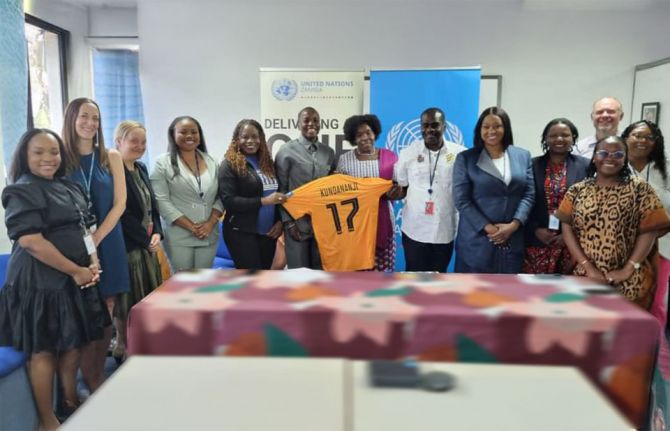 Zambian football star Racheal Kundananji named UNAIDS Goodwill Ambassador for Education Plus in Zambia
Zambian football star Racheal Kundananji named UNAIDS Goodwill Ambassador for Education Plus in Zambia

23 January 2025
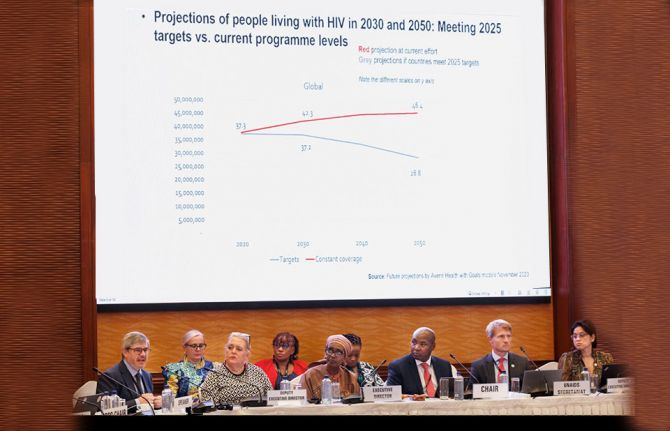 Global leaders commit to accelerating global efforts to end AIDS as a public health threat by 2030
Global leaders commit to accelerating global efforts to end AIDS as a public health threat by 2030

13 December 2024
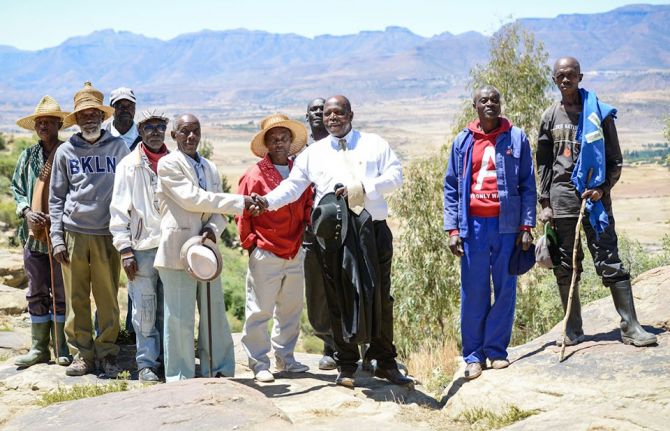 To end AIDS, communities mobilize to engage men and boys
To end AIDS, communities mobilize to engage men and boys

04 December 2024
 Global celebrities unite behind UNAIDS’ call for world leaders to “take the rights path to end AIDS”
Global celebrities unite behind UNAIDS’ call for world leaders to “take the rights path to end AIDS”

01 December 2024
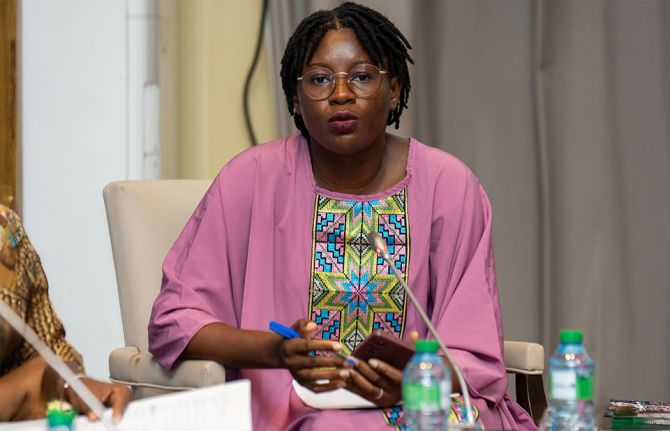 Empowering youth to lead Togo’s HIV response
Empowering youth to lead Togo’s HIV response

31 October 2024

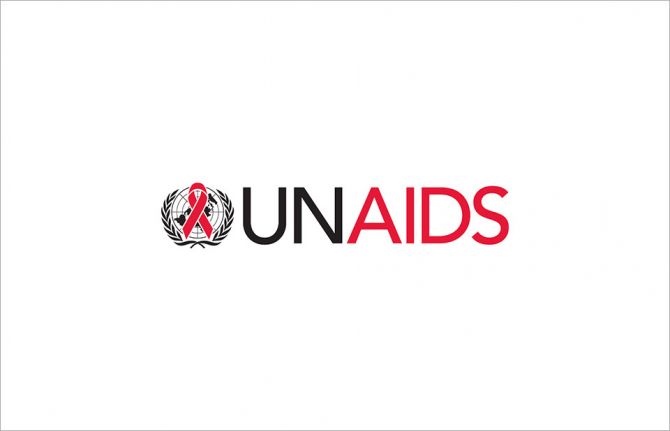
Press Release
Thailand hosts global HIV meeting this week, showcases AIDS response leadership
11 December 2022 11 December 2022BANGKOK, 11 December 2022—The 51st meeting of the UNAIDS Programme Coordinating Board (PCB) will be held from December 13 - 16 in Chiang Mai, Thailand. The meeting is hosted by the Government of Thailand as Chair of the 2022 PCB. It is the first time in 14 years that the board will meet outside Geneva, Switzerland and the second time it will be in Chiang Mai.
“We are grateful to Thailand for its global AIDS response leadership. The country has taken significant strides toward ending its HIV epidemic and is setting an example for the world of translating political will into action,” said Taoufik Bakkali, Director a.i. of the UNAIDS Regional Support Team for Asia and the Pacific.
Hosting this meeting in Thailand helps sustain momentum in the Asia Pacific region to fulfill commitments made by the community of nations in the 2021 political declaration on HIV, Mr. Bakkali said.
The UNAIDS Programme Coordinating Board meeting demonstrates an inclusive approach. Civil society organizations, including associations of people living with HIV, will sit around the table with member states and UN agencies. The attendees will go together to visit and learn from programmes supporting affected people. “This inclusivity is at the heart of the effectiveness of the UNAIDS approach,” said Mr Bakkali. “Increasingly, it is being asked of international processes where are they being held, who is participating, and how is the process connecting with experiences of the most affected people. This meeting is being held in a country which has so many lessons to share from its AIDS response.”
The UNAIDS Programme Coordinating Board provides oversight and strategic direction for the Joint United Nations Programme on HIV and AIDS, which guides and supports the HIV response globally.
The 22nd PCB meeting in 2008 was also held in Chiang Mai under the auspices of former Public Health Minister, Chavarat Charnvirakul. This meeting will be chaired by his son, Deputy Prime Minister and Minister of Public Health, Anutin Charnvirakul.
The Thailand HIV response
There were an estimated 520,000 people living with HIV in 2021.
Thailand has made considerable progress against AIDS, especially in providing life-saving testing and treatment to people living with HIV. The country was first in the region to be validated as having eliminated mother-to-child HIV transmission in 2016. It has also joined the Global Partnership to Eliminate all Forms of HIV-related Stigma and Discrimination.
Since 2010, AIDS-related deaths have declined by almost two-thirds (65%) while new infections fell by 58%. Last year an estimated 94% of people living with HIV in Thailand were aware of their status. Ninety-one percent of diagnosed people were on treatment and 97% of those on treatment achieved viral suppression.
Ahead of the PCB, delegates will learn about notable Thailand HIV response successes. The country has been a trailblazer for integrating HIV services into the Universal Health Coverage scheme. This has become a mechanism for sustainable HIV response financing by significantly increasing investments in key population- and community-led health services.
Thailand has leveraged several best practices to end AIDS, including legalizing over-the-counter sales of HIV self-test kits, scaling up same-day treatment initiation for newly diagnosed people and successfully rolling-out a pre-exposure prophylaxis (PrEP) programme. (PrEP is a daily medicine taken by an HIV negative person to prevent contracting the virus.) Thailand’s focus on public health, and its efforts in tackling stigma and discrimination, have been key to progress made.
“Thailand is on-track to meet and exceed the 2025 95% testing and treatment targets. To do so it must reach those still not accessing HIV prevention, testing, treatment and care services,” said UNAIDS Country Director for Thailand, Patchara Benjarattanaporn. She noted that a key priority now is for Thailand to get people diagnosed earlier and further reduce new infections. Last year there were an estimated 6500 new HIV infections in Thailand. Critically, half of all new infections occur among young people between ages 15 and 24, most of them among people in key population communities.
“Thailand provides excellent HIV services. Unfortunately, too many young people do not get the prevention information, services and support they need. And some people living with HIV become aware of their status late, with already advanced illness. As we work to reach those being left behind, we must address inequalities in access to information, services and support and continue to innovate and scale up effective, community-led approaches,” Ms. Benjarattanaporn said. “Through bold action to tackle inequalities, we can end AIDS by 2030.”
UNAIDS
The Joint United Nations Programme on HIV/AIDS (UNAIDS) leads and inspires the world to achieve its shared vision of zero new HIV infections, zero discrimination and zero AIDS-related deaths. UNAIDS unites the efforts of 11 UN organizations—UNHCR, UNICEF, WFP, UNDP, UNFPA, UNODC, UN Women, ILO, UNESCO, WHO and the World Bank—and works closely with global and national partners towards ending the AIDS epidemic by 2030 as part of the Sustainable Development Goals. Learn more at unaids.org and connect with us on Facebook, Twitter, Instagram and YouTube.

Press Release
UNAIDS Board approves 2022–2023 budget and a five-year results and accountability framework
07 October 2021 07 October 2021GENEVA, 7 October 2021—The UNAIDS Programme Coordinating Board (PCB) has approved, at a special session, the Unified Budget, Results and Accountability Framework (UBRAF) for 2022–2026 and the UNAIDS budget for 2022 and 2023. The approved budget is set at up to a threshold of US$ 210 million per year.
“We must prevent a resurgent AIDS crisis. COVID-19 lockdowns and other restrictions have badly disrupted the use of HIV prevention services, access to HIV testing, and in many countries this led to steep drops in HIV diagnoses, referrals to care services, the initiation of HIV treatment and limitation in access to viral load testing. This is of great concern. That’s why approval of the UBRAF is so important,” said Winnie Byanyima, UNAIDS Executive Director, at the opening of the special session.
The UBRAF is the overall framework for the collective contribution of the UNAIDS Joint Programme to the global HIV response. It is the framework for leveraging the advantages, strengths and mandates of the 11 UNAIDS Cosponsors and the Secretariat for the full and effective implementation of the Global AIDS Strategy 2021–2026: End Inequalities, End AIDS, placing people and communities at the centre and in strong partnership with other stakeholders.
Under the new UBRAF, from 2022 to 2026 the Joint Programme will:
- Maximize its global leadership and advocacy.
- Create and promote the distribution of global public goods that are critical to ending AIDS.
- Support countries and communities through coordinated technical guidance and support.
- Facilitate and support strategic information and knowledge-sharing.
- Convene and facilitate multistakeholder dialogues to achieve enabling environments and leverage inclusive partnerships and investments to close programmatic and policy gaps for greater accountability, efficiencies and impact.
Areas of intensified focus and investment under the UBRAF are to:
- Tackle inequalities in order to ensure equitable access to services for HIV prevention, treatment, care and support.
- Foster leadership and support for innovative approaches to achieve more inclusive HIV services.
- Benefit from scaled-up HIV combination prevention and testing and treatment, with a focus on closing service gaps among those who are the furthest left behind.
- Champion the empowerment and resourcing of communities for stronger community-led responses that lead scaled-up service delivery and respond to needs.
- Strengthen societal enablers through more robust social, institutional and structural capacities of countries and communities for social protection, establishing and strengthening enabling legal environments, successfully eliminating stigma and discrimination and reaching gender equality in the HIV response.
- Advance the increased availability and financing of sustainable systems to achieve the 2025 HIV targets.
“Thank you for approving the framework and the budget. I took note and am encouraged by the clear requests and support by Board members for a fully funded UBRAF at US$ 210 million to help the Joint Programme deliver transformative and life-saving work towards the goals in the Global AIDS Strategy 2021–2026,” added Ms Byanyima at the session’s closing.
UNAIDS
The Joint United Nations Programme on HIV/AIDS (UNAIDS) leads and inspires the world to achieve its shared vision of zero new HIV infections, zero discrimination and zero AIDS-related deaths. UNAIDS unites the efforts of 11 UN organizations—UNHCR, UNICEF, WFP, UNDP, UNFPA, UNODC, UN Women, ILO, UNESCO, WHO and the World Bank—and works closely with global and national partners towards ending the AIDS epidemic by 2030 as part of the Sustainable Development Goals. Learn more at unaids.org and connect with us on Facebook, Twitter, Instagram and YouTube.
Special session, UNAIDS Programme Coordinating Board, 6 October 2021

Press Release
UNAIDS Board closes after discussing the way forward for the new 2022–2026 UNAIDS budget, results and accountability framework
06 July 2021 06 July 2021GENEVA, 6 July 2021—The 48th meeting of the UNAIDS Programme Coordinating Board (PCB), which commenced on 29 June 2021, closed on 2 July.
In her opening remarks to the meeting, the UNAIDS Executive Director, Winnie Byanyima, updated the PCB on the progress made in the priority areas she committed to focus on at her first PCB, in December 2019: developing the next UNAIDS strategy, transforming the internal culture of the UNAIDS Secretariat, increasing and optimizing the use of resources for the Joint Programme and emerging programmatic priorities for action.
Reflecting on the recent adoption of the new Global AIDS Strategy 2021–2026: End Inequalities, End AIDS and the United Nations General Assembly Political Declaration: Ending Inequalities and Getting on Track to End AIDS by 2030, Ms Byanyima urged countries not to forget HIV during the COVID-19 pandemic. “AIDS is not over. It is still one of the deadliest pandemics of our times. We have lost nearly 35 million people to AIDS. And last year, there were 1.5 million new HIV infections, all preventable, and 690 000 deaths, all treatable,” she said.
Ms Byanyima spoke about how UNAIDS had responded rapidly to the COVID-19 pandemic, setting out how around 70 UNAIDS country offices worldwide had supported COVID-19 response plans and are engaged in rapid responses to COVID-19 and HIV. She also spoke about how UNAIDS is responding to a range of pressing human rights concerns unleashed by COVID-19 and lockdowns that are adversely impacting access to HIV services.
In her update on building a safe, equal and empowering workplace for everyone, the Executive Director set out the practical actions that had been taken to mitigate COVID-19’s impact on staff well-being, the progress made on the Management Action Plan for a Healthy, Equitable and Enabling Workplace for all UNAIDS Staff, improvements to the internal justice system and how the culture transformation is progressing.
During the PCB meeting, a number of important areas related to the work of UNAIDS were discussed. The UNAIDS financial report and audited financial statements for 2020 and an update on strategic human resources management issues were examined. The PCB received, for the first time, a report of the ethics office and a management response to the annual organizational oversight reports, including the reports of the internal and external auditors.
The PCB also followed up on the last PCB meeting’s thematic segment on cervical cancer and HIV and was updated on the HIV response for migrant and mobile populations.
A zero draft of the UNAIDS Unified Budget, Results and Accountability Framework (UBRAF) 2022–2026 was presented to the PCB during the meeting. The final version of the UBRAF, which maximizes the coherence, coordination and impact of the United Nations’ response to HIV by combining the efforts of the UNAIDS Cosponsors and Secretariat from 2022 to 2026, will be submitted to the PCB at a special session in October this year.
“With the PCB’s guidance and support, we can shape our new UBRAF to be a solid and meaningful framework that will allow us to translate our reinvigorated commitment and best value for investment into action for results in support of countries and communities and to continue to demonstrate strong accountability to the PCB and the wider AIDS community,” Ms Byanyima said.
Ms Byanyima thanked Meryame Kitir, Minister of Development Cooperation of Belgium, for her political leadership and the announcement of a new multiyear agreement in support of UNAIDS, modelling good donorship and demonstrating true international solidarity.
John Nkengasong, the Director of the Africa Centres for Disease Control and Prevention, addressed the PCB in its session on leadership in the HIV response.
The PCB concluded with a thematic segment on COVID-19 and HIV, which explored the epidemiology of the colliding pandemics, how COVID-19 is impacting HIV programming and inequalities and the vital role that communities have played in mitigating the impacts and how to sustain the gains made in the response to HIV and build back a better and fairer HIV response.
The meeting was chaired by Namibia, with Thailand serving as the Vice-Chair and the United States of America as the Rapporteur. The report to the Board by the UNAIDS Executive Director and the PCB’s decisions can be found at unaids.org/en/whoweare/pcb/48.
UNAIDS
The Joint United Nations Programme on HIV/AIDS (UNAIDS) leads and inspires the world to achieve its shared vision of zero new HIV infections, zero discrimination and zero AIDS-related deaths. UNAIDS unites the efforts of 11 UN organizations—UNHCR, UNICEF, WFP, UNDP, UNFPA, UNODC, UN Women, ILO, UNESCO, WHO and the World Bank—and works closely with global and national partners towards ending the AIDS epidemic by 2030 as part of the Sustainable Development Goals. Learn more at unaids.org and connect with us on Facebook, Twitter, Instagram and YouTube.
Contact
UNAIDS GenevaSophie Barton-Knott
tel. +41 79 514 68 96
bartonknotts@unaids.org
UNAIDS Media
tel. +41 22 791 4237
communications@unaids.org

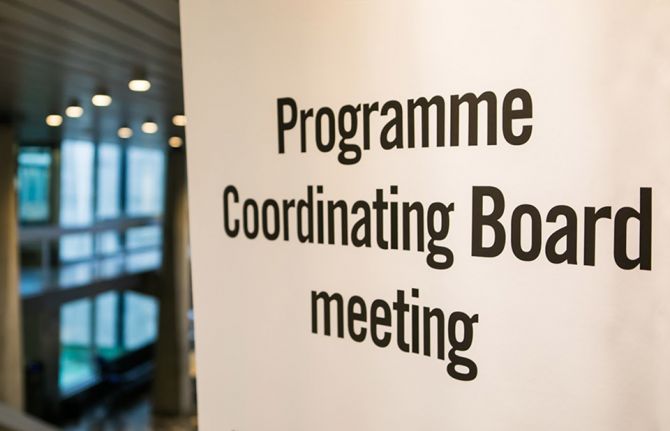
Press Release
UNAIDS Board discusses UNAIDS’ work on COVID-19 and HIV and UNAIDS’ next strategy and its transformative agenda
26 June 2020 26 June 2020GENEVA, 26 June 2020—The 46th meeting of the UNAIDS Programme Coordinating Board (PCB) has concluded in Geneva, Switzerland. The PCB, which met from 23 to 25 June 2020, was held for the very first time as a virtual meeting because of the COVID-19 pandemic. The PCB, chaired by the United States of America, had decided that it would be important to demonstrate that the intergovernmental process can continue to work effectively during the COVID-19 pandemic.
During the meeting, a series of crucial decisions were taken on the future of the HIV response and on the transformation of UNAIDS, while the interconnectedness between the twin pandemics of HIV and COVID-19 was discussed and reflected upon.
“I thank the Programme Coordinating Board for the trust it has given us to take forward our ambitious agenda,” said Winnie Byanyima, Executive Director of UNAIDS. “I am excited that further work towards a new global HIV strategy for an HIV response that incorporates the COVID-19 and post-COVID-19 realities, and for a fitter and more responsive UNAIDS, has been given the green light. I’m looking forward to putting this work into action.”
The three-day meeting opened with an overview given by Ms Byanyima on the HIV/COVID-19 landscape in mid-2020, which stressed that the HIV epidemic is urgent and very much unfinished business and that the world is off course to meet the 2020 HIV targets. She urged countries to leverage the decades of investment in the HIV response and to learn the lessons from a history of unequal access to HIV services and apply them to the fight against COVID-19, including by supporting a People’s Vaccine.
The critical nature of the next UNAIDS strategy—a strategy that it was acknowledged must be ambitious, visionary, data-driven, evidence-informed, well resourced and well received—was discussed by the participants. The PCB laid out a timeline of milestones for the development of the bold new strategy and decided that UNAIDS would present a report on the outcome of the ongoing review and consultations on the strategy for approval by the end of October 2020. A draft of the strategy will be discussed at the next PCB meeting, in December 2020.
The PCB also debated the transformation of UNAIDS. The PCB heard an update on the implementation of the Management Action Plan, which was set up to ensure a healthy, equitable and enabling workplace for all UNAIDS staff. It welcomed the progress made so far and called for faster progress, particularly on strengthening systems of internal justice and redress. The PCB working group on the recommendations of the Joint Inspection Unit (JIU) also gave an update on its work to ensure that the JIU’s recommendations are acted upon.
When discussing the UNAIDS Unified Budget, Results and Accountability Framework, the PCB recognized that UNAIDS delivers on its core mandate, leads in reaching the people who are being left the furthest behind and targets inequalities. UNAIDS’ strengthened work at the country level was welcomed.
Reports on performance monitoring of UNAIDS, UNAIDS’ finances and strategic human resources management issues were examined at the meeting. The PCB welcomed the reported accomplishments of the Joint Programme in strengthening joint and collaborative action at the country level but expressed concern about the forecast US$ 15 million shortfall against the core budget. The announcement by the Government of Germany that it had contributed a further €20 million to UNAIDS in 2020 was welcomed, however. The PCB also welcomed that the reports of the external and internal auditors were discussed in a distinct agenda item, where PCB members engaged with the auditors.
The planned thematic segment on cervical cancer that was due to be held on 25 June will now be held during the December PCB meeting.
Representatives of United Nations Member States, international organizations, civil society and nongovernmental organizations attended the three-day meeting, which was chaired by the United States of America, with Namibia serving as Vice-Chair and India as Rapporteur.
The report to the Board by the UNAIDS Executive Director and the PCB’s decisions can be found at https://www.unaids.org/en/whoweare/pcb/46.
UNAIDS
The Joint United Nations Programme on HIV/AIDS (UNAIDS) leads and inspires the world to achieve its shared vision of zero new HIV infections, zero discrimination and zero AIDS-related deaths. UNAIDS unites the efforts of 11 UN organizations—UNHCR, UNICEF, WFP, UNDP, UNFPA, UNODC, UN Women, ILO, UNESCO, WHO and the World Bank—and works closely with global and national partners towards ending the AIDS epidemic by 2030 as part of the Sustainable Development Goals. Learn more at unaids.org and connect with us on Facebook, Twitter, Instagram and YouTube.
Contact
UNAIDS GenevaSophie Barton-Knott
tel. +41 79 514 68 96
bartonknotts@unaids.org
UNAIDS Media
tel. +41 22 791 4237
communications@unaids.org
Press centre
Download the printable version (PDF)

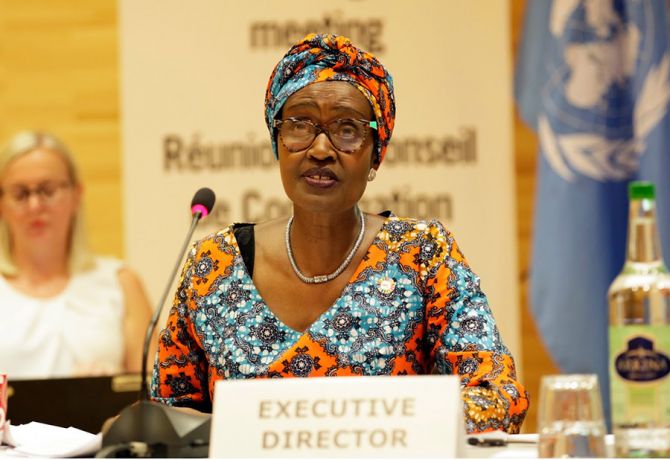
Press Release
UNAIDS Executive Director sets out HIV/COVID-19 landscape at opening of PCB meeting
24 June 2020 24 June 2020GENEVA, 24 June 2020—The 46th meeting of the UNAIDS Programme Coordinating Board commenced on 23 June 2020. Held for the first time as a virtual meeting, as a result of the COVID-19 pandemic, the meeting will see three days of discussion and reflection on the HIV response, the interconnectedness between the twin pandemics of HIV and COVID-19 and the work of the Secretariat and the Joint Programme.
In her opening address to the PCB meeting, Winnie Byanyima, the Executive Director of UNAIDS, presented an overview of the HIV/COVID-19 landscape in mid-2020 and told the online audience that the HIV epidemic is still urgent, unfinished business.
“Even before COVID-19 we were not on track to meet our targets for 2020. Now the COVID-19 crisis risks blowing us way off course,” warned Ms Byanyima. “As a Joint Programme, we must address the deeper challenges to recover from this crisis to beat both pandemics and foster safe, equitable and resilient societies,” she added.
Ms Byanyima urged countries to learn the lessons from a history of unequal access to HIV services and apply them to the fight against COVID-19. She noted that millions of people died from AIDS-related illnesses while there were medicines available that could have saved their lives—leaving access to medicines to pharmaceutical companies resulted in prices that were too high for people in developing countries.
In the same vein, Ms Byanyima reiterated her call for a People’s Vaccine for COVID-19, with an international agreement that any vaccines and treatments discovered for COVID-19 be made available to all countries. “Developing countries must not be priced out,” she said.
The Executive Director also spoke about the increasing relevance of UNAIDS during a new pandemic and how it has a unique combination of experience and expertise that can help ensure that investments in the COVID-19 response reflect the vital lessons learned from the HIV response.
Supporting HIV treatment and prevention, working on the front line with communities, supporting human rights and gender equality and campaigning against stigma and discrimination—these are part of UNAIDS’ core mandate, she told the meeting. UNAIDS will continue to deliver on that mandate and reach the people who are left the furthest behind, but will also move the global policy needle and tackle the inequalities that place people at greater risk of both HIV and COVID-19, she said.
Turning to the next global UNAIDS strategy, Ms Byanyima committed that the critical new strategy, designed to shape an improved HIV response, will reflect the widest possible input and engagement—from the PCB, its constituencies and the global AIDS community. She suggested that an ambitious draft strategy be presented to the 47th meeting of the PCB in December 2020, with a final version to be reviewed and adopted by the PCB in March 2021.
Ms Byanyima updated the PCB on the internal transformation of UNAIDS, outlining how she will bring feminist leadership principles to help change the culture of the organization. A series of other steps—including a revised performance management system and an independent ethics function—that will ensure that the transformation continues to be on course were announced.
Ms Byanyima ended her address with a reminder of the huge returns that are seen from investing in UNAIDS. She said that it is vital that UNAIDS, along with funding sources such as the Global Fund to Fight AIDS, Tuberculosis and Malaria and the United States President’s Emergency Plan for AIDS Relief, be fully funded.
“As COVID-19 has shown, investments in HIV principles, approaches and infrastructure and expertise extend far beyond the AIDS response,” she said.
UNAIDS
The Joint United Nations Programme on HIV/AIDS (UNAIDS) leads and inspires the world to achieve its shared vision of zero new HIV infections, zero discrimination and zero AIDS-related deaths. UNAIDS unites the efforts of 11 UN organizations—UNHCR, UNICEF, WFP, UNDP, UNFPA, UNODC, UN Women, ILO, UNESCO, WHO and the World Bank—and works closely with global and national partners towards ending the AIDS epidemic by 2030 as part of the Sustainable Development Goals. Learn more at unaids.org and connect with us on Facebook, Twitter, Instagram and YouTube.
Contact
UNAIDS GenevaSophie Barton-Knott
tel. +41 79 514 68 96
bartonknotts@unaids.org
UNAIDS Media
tel. +41 22 791 4237
communications@unaids.org
Press centre
Download the printable version (PDF)

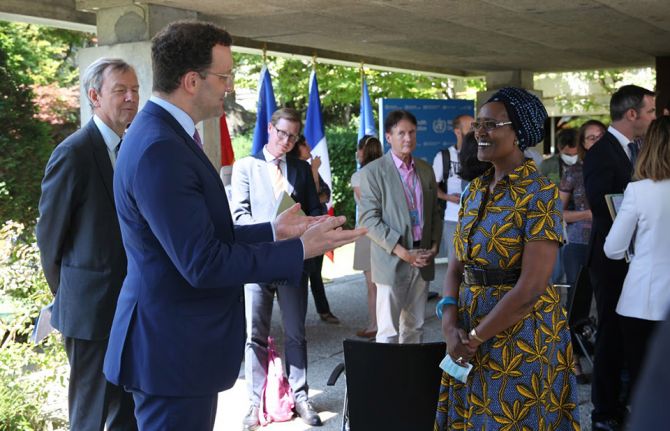
Press Release
Germany ramps up its contribution to the HIV response with an extra €20 million to UNAIDS
25 June 2020 25 June 2020GENEVA, 25 June 2020—The Government of Germany has announced that, in addition to its annual core contribution of €5 million, it will contribute a further €20 million to UNAIDS in 2020 to strengthen the response to HIV during the COVID-19 pandemic. The Federal Minister of Health, Jens Spahn, made the announcement during a meeting with Winnie Byanyima, the UNAIDS Executive Director, in Geneva, Switzerland, during the 46th meeting of the UNAIDS Programme Coordinating Board.
“We commend UNAIDS’ work in the fight against COVID-19, which focuses on engaging communities, ensuring that vulnerable and key populations are reached with essential health services, including HIV services, protecting basic rights and mitigating the socioeconomic impacts of the epidemic,” said Mr Spahn. “With the additional funds, we encourage UNAIDS to continue this important work alongside the World Health Organization and other global health partners.”
The Government of Germany and parliamentarians, civil society and other partners in Germany have long shown commitment to the global HIV response and to global health and health security, with Germany pledging US$ 1 billion to the Global Fund to Fight AIDS, Tuberculosis and Malaria at its last replenishment. A valued partner of UNAIDS, the Government of Germany is firmly committed to ending AIDS as a public health threat by 2030 and has invested significant resources to ensure that no one is left behind.
“UNAIDS welcomes this show of support by Germany. It is an encouraging recognition of the work undertaken by UNAIDS with countries and partners to respond to HIV during the COVID-19 pandemic. It is also a crucial recognition of the lessons and experiences gained over the past decades in the HIV response, which are now being used in the fight against COVID-19,” said Ms Byanyima. “I call upon others to follow Germany’s lead and continue to invest in the global HIV response.”
German’s increased support is a critical investment in saving lives and protecting the dignity of people living with or at risk of HIV. At a time when the world faces the colliding pandemics of HIV and COVID-19, Germany is continuing to demonstrate the need for shared responsibility and global solidarity. Modelling suggests that an unmitigated six-month interruption of HIV services due to COVID-19 could double AIDS-related deaths in sub-Saharan Africa, setting the clock on AIDS-related deaths in the region back to 2008, and could increase new paediatric HIV infections by up to 162%.
UNAIDS
The Joint United Nations Programme on HIV/AIDS (UNAIDS) leads and inspires the world to achieve its shared vision of zero new HIV infections, zero discrimination and zero AIDS-related deaths. UNAIDS unites the efforts of 11 UN organizations—UNHCR, UNICEF, WFP, UNDP, UNFPA, UNODC, UN Women, ILO, UNESCO, WHO and the World Bank—and works closely with global and national partners towards ending the AIDS epidemic by 2030 as part of the Sustainable Development Goals. Learn more at unaids.org and connect with us on Facebook, Twitter, Instagram and YouTube.
Contact
UNAIDS GenevaSophie Barton-Knott
tel. +41 79 514 68 96
bartonknotts@unaids.org
UNAIDS Media
tel. +41 22 791 4237
communications@unaids.org
Our work
Press centre
Download the printable version (PDF)




